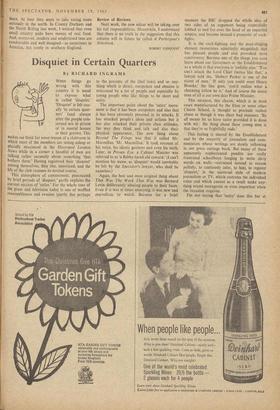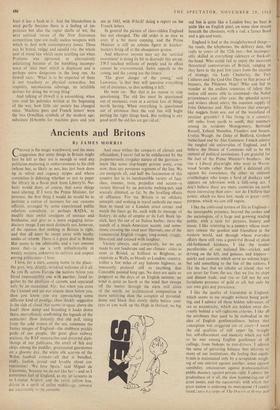Disquiet in Certain Quarters
By RICHARD INGRAMS This atmosphere of contentment, punctuated by brief periods of 'disquiet,' partly explains the current success of 'satire.' For the whole tone of the press and television today is one of muffled reasonableness and evasion (partly due perhaps to the pressure of the libel laws) and so any- thing which is direct, outspoken and abusive is welcomed by a lot of people and especially by young people who like things to be short and noisy.
The important point about the 'satire' move- ment is that it has been outspoken and also that it has been extremely personal in its attacks. It has attacked people's ideas and actions but it has also attacked their private class attitudes, the way they think and talk and also their physical appearance. The new thing about Beyond The Fringe was that it called Mr. Macmillan `Mr. Macmillan.' It took account of his voice, his idiotic gestures and even his teeth. Later, in Private Eye, a Cabinet Minister was referred to as 'a flabby-faced old coward.' (I can't mention his name, as 'disquiet' would inevitably be felt by the Spectator's lawyer, who shall be nameless.) Again, the best and most original thing about That Was The Week That Was was Bernard Levin deliberately abusing people to their faces. Even if it was at times annoying, it was new and marvellous to watch. Because for a brief
moment the BBC dropped the whole idea of two sides of an argument -being respectfully lobbed to and fro over the head of an impartial umpire, and became instead a promoter of cock- fights.
It is the cock-fighting and the mud-slinging element (sometimes admittedly misguided) that has pleased people and also provoked most controversy. Because one of the things you soon learn about our Governors or the Establishment as a whole is that everyone is 'awfully nice.' You can't attack the Lord Chief Justice like that,' a lawyer told me, 'Hubert Parker is one of the nicest of men.' If only you could meet Henry Brooke,' the line goes, 'you'd realise what a charming fellow he is.' And of course the nicest man of all is our own dear Prime Minister.
This niceness, this charm, which is in most cases manufactured by the Eton or some other Charm School, is thought to preclude violent abuse as though it was sheer bad manners. 'By all means let us have satire provided it is done with wit : the thing about these young men is that they're so frightfully rude.'
This feeling is shared by the Establishment and by the majority of journalists and com- mentators whose writings are slowly yellowing in our press cuttings book. But many of these apparently sophisticated pundits are really frustrated schoolboys longing to write dirty words on walls—restrained instead to reason politely, to cautiously infer, to hint, to register 'disquiet,' in the universal style of modern journalism or TV, which castrates the individual voice and which cannot as a result make any- thing sound outrageous or even important when the occasion requires.
I'm not saying that 'satire' does this but at
least it has a bash at it. And the blunderbuss is used partly because there is a feeling of im- patience but also the rapier shafts of wit, the neat satirical verses of the New Statesman competition type are really useless weapons with which to deal with contemporary issues. These• can be brutal, vulgar and squalid (viz. the whole nest of wood lice which came scuttling out when Profumo was uprooted, or alternatively infuriating because of the bumbling incompe- tence of 'nice men' which is displayed and is perhaps more dangerous in the long run. As Orwell says: 'What is to be expected of them is not treachery or physical cowardice, but stupidity, unconscious sabotage, an infallible instinct for doing the wrong thing.'
And talking of Orwell it is astonishing, when you read his polemics written at the beginning of the war, how little our society has changed since. 'Machine guns and French letters' were the two Orwellian symbols of the modern age; substitute H-bombs for machine guns and you
are in 1963, with Which? doing a report on the French letters.
In general the picture of class-ridden England has not changed. The old order is as nice as ever, 'if a bit more cunning, and the Prime Minister is still an asinine figure in knicker- bockers firing off at the obsequious grouse.
And whatever anyone may say the 'satirical movement' is doing its bit to discredit this set-up. TW3 reached millions of people and its effect cannot be overestimated. Satire appeals to the young, and the young are the future.
'The great danger of the young,' said Lawrence, 'is that' they will question everything out of existence, so that nothing is left.'
He went on: 'But that is no reason to stop questioning. The old lies must be questioned out of existence, even at a certain loss of things worth having. When everything is questioned out of existence then the real fun will begin putting the right things back. But nothing is any good until the old lies are got rid of.'































































 Previous page
Previous page